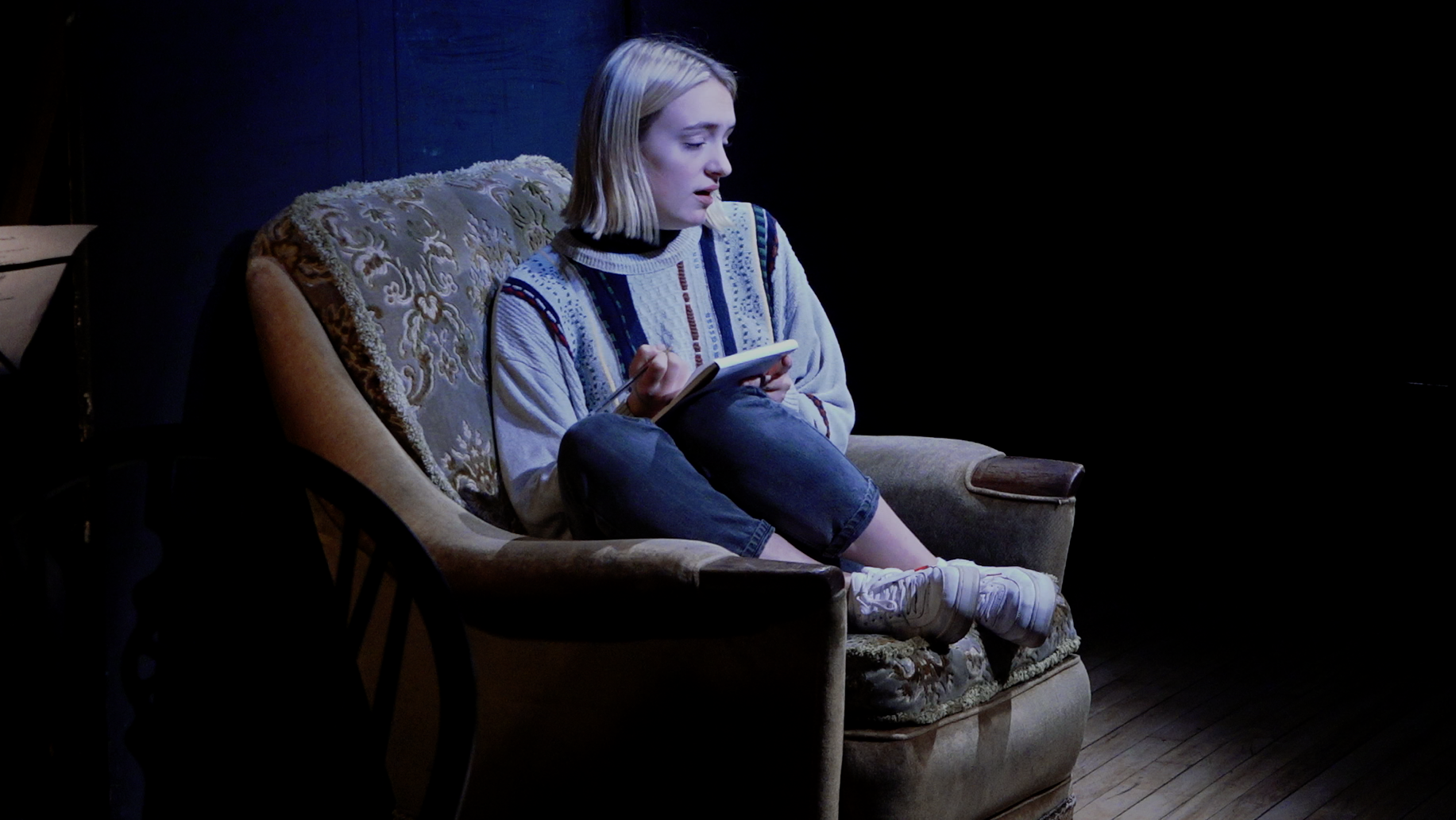TW/CW: Domestic abuse/abusive relationships
Nice Guy, a new musical co-written by Sam Norman and Aaron King running for five nights at the Burton Taylor Studio, opens diminutively with an epistolary narrative from the lead role, Isla (Grace Albery). She drafts out loud a difficult first letter home to her father in Ireland after moving away to University near London; the effect is deliberately cliché to convince us we know how this story ends.
The structure too seems pretty conventional at first. We alternate between hearing Isla’s epistles home, and then watching the scenes she describes acted out: she embarks on her degree, makes friends with Francine (Ellie Thomas), and goes on a date with the charmingly self-deprecating and flattering Dash (Alex Buchanan). There are subtle but conspicuous inconsistencies between what Isla tells her father and what really happens. As we watch Isla’s relationship with Dash develop, there are a couple of uncomfortable moments – Isla goes vegan just like Dash, then she abandons her degree, and stops seeing Francine.
Knowing Nice Guy to be about abusive relationships, I was expecting Dash to suddenly become overtly controlling and physically aggressive – but Norman and King have deliberately structured the musical to illustrate the difference between appearance and reality, the expected and the unexpected. Through the first half of the play the audience witnesses Isla’s life from the perspective of her father. Like her father, we receive only the facts that Isla chooses to tell us, and so nothing much seems amiss until she confesses that “the truth’s a bit different”. We then re-watch the same scenes played out again, this time with added crescendos in unexpected places. In the first half of the play, we see Dash snap briefly at Isla in what she describes to her father as a “bit of a tiff”. In the second, we watch the same scene over but it culminates in Dash throwing wine at Isla, shattering the glass and slapping her around the face. In the first half we watch him offer her an oreo; in the second he warns her “not to get fat” and then explodes when she says she feels objectified.
The play essentially explores the difference between fiction and truth. Dash, the “nice guy”, crafts for himself an ingratiating persona that masks his malicious actuality, just as Isla creates through her letters a fiction of her own reality, a warped version of the truth idealised through a rosy lens of wishful-thinking. The script handles sickeningly disturbing issues (gaslighting, psychological manipulation, physical and sexual violence) with astounding sensitivity, whilst somehow making moments of laugh-out-loud humour appropriate – and manages to pull it all off with a remarkably unlaboured light touch. In the least patronising way possible, it is hard to believe this production has been written by students, such is the maturity and emotional depth of the narrative.
The play is a musical: the scenes are regularly punctuated with impressive solos accompanied by a small but talented orchestra behind the stage. As for the songs – think La La Land with a dark twist. There is something very haunting about the upbeat, chipper melodies complete with kitschy dance step choreography amid a tale of harrowing psychological abuse: we get the feeling that these merry tunes are what everyone hears when they look at the relationship, which is, on paper, love’s young dream. It helps that the cast of three are also extremely good singers; Albery in particular moves a significant portion of the audience to tears with some of her later sung letters home, censoring out the worst of her ordeal and drawing on her recurring line, “Everything’s fine”.
The Burton Taylor Studio is the perfect setting for a play about the inside, the unseen: with the tiered seats gone and a small central stage formed between three sides of audience, we get a strong sense of the domestic claustrophobia and the confinement and isolation of an abusive relationship. The cast worked in conjunction with Clean Slate, an Oxford based charity helping victims of abuse, and their insight into the issue is visible through a real understanding of unhealthy intimacy. The acting is certainly good: Albery has the gift of convincing the audience she knows more about her character than they do, and Buchanan’s charmingly gawky initial façade is very convincing, whilst his later rages terrifying. His creation of a nuanced psychological manipulator is a masterpiece.
Overall then, Nice Guy compounds exceptional acting, first-rate music and a profoundly compelling script to distort, construct, and deconstruct reality, in a chilling expression of the dichotomy between what we see and what we do not. I would heartily recommend you book a seat – but unsurprisingly they have already all sold out.



